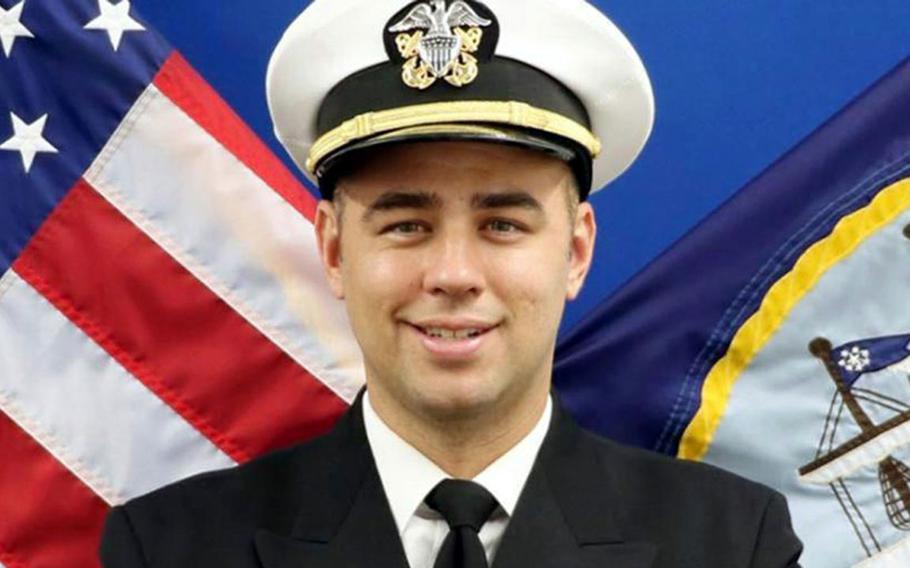
Navy Lt. Ridge Alkonis was convicted in October 2021 by a three-judge panel in Shizuoka District Court of negligent driving causing the deaths of two people and injuring a third in May 2021. (U.S. Navy)
A Navy officer convicted of a fatal traffic collision in Japan two years ago will not be promoted, despite outcries from his family and supporters.
Secretary of the Navy Carlos Del Toro has denied Lt. Ridge Alkonis a promotion to lieutenant commander, according to a statement emailed to Stars and Stripes on Tuesday by the Navy Office of Information.
“I reached this decision after a complete review of the facts and circumstances surrounding his case, to include forwarding this matter to a Special Selection Review Board,” Del Toro said in the statement.
He said he takes seriously his responsibility to “ensure fair and equal consideration of every personnel matter under my purview.”
Alkonis was transferred to U.S. custody in December and freed on Jan. 12 by an order from the U.S. Parole Commission.
In similar cases, the convicted service member is typically, but not always, discharged from the service, according to legal experts who spoke with Stars and Stripes.
“Conviction for any criminal offense is normally career ending; conviction for criminal homicide would almost certainly have that impact for any officer,” even though the deaths were unintended, Geoffrey Corn, a retired Army lieutenant colonel and Texas Tech University law professor, said by email Monday.
A Japanese court convicted Alkonis of negligent driving causing the deaths of two Japanese citizens and injuries to a third in Fujinomiya, Japan, on May 29, 2021.
Alkonis blacked out behind the wheel following a family trip to Mount Fuji. The car veered into a restaurant parking lot, striking vehicles and pedestrians and causing the deaths of a woman, 85, and her son-in-law, 54.
In court, Alkonis expressed remorse and said mountain sickness caused him to pass out, a defense rejected twice by Japanese courts. He served less than half of the three-year sentence handed him in October 2021.
Any officer that holds onto their career after a similar conviction “would not be selected for promotion,” said Todd Huntley, director of Georgetown University’s National Security Law Program and a retired Navy judge advocate. Instead, they would likely be forced out by a board of inquiry or after reaching the maximum years at their rank, he said by email Monday.
During Alkonis’ incarceration, his supporters mounted a vigorous campaign demanding his release, saying the Navy lieutenant was the victim of Japanese injustice. His wife, Brittany Alkonis, and U.S. Sen. Mike Lee, R-Utah, appealed online, in Congress and to President Joe Biden directly to pressure Japan to release the imprisoned officer or transfer him to U.S. custody.
Lee in the Senate successfully won the officer his pay and benefits while incarcerated.
Brittany Alkonis remained persistent, making her husband’s case on network news and demonstrating outside the White House to keep his case alive.
“To all military spouses, your military member’s career will be affected by everything you do and say,” she wrote Jan. 20 on X, formerly Twitter. “#LtRidgeAlkonis is being punished for MY advocacy and nothing more.”
Prior to the fatal crash, the Navy had selected Alkonis for promotion, according to supporter Andrew Eubanks. He posted portions of Navy records on X that he said support Alkonis’ bid for promotion but declined to provide full copies to Stars and Stripes.
Del Toro and Rear Adm. Carl Lahti, the head of U.S. Naval Forces Japan, “abused their power” and punished Alkonis for “unwanted social media attention,” Eubanks wrote in a Jan. 20 post on X.
Aside from his conviction, Alkonis also caused “diplomatic fallout” between the U.S. and Japan, said Brenner Fissell, a law professor at Villanova University and former appellate defense counsel at Guantanamo Bay Naval Base, Cuba.
Even in the U.S., “it is really hard to imagine any officer being retained after being convicted of any homicide offense,” he said by email Monday. “Remember that service members are routinely discharged for minor drug offenses.”